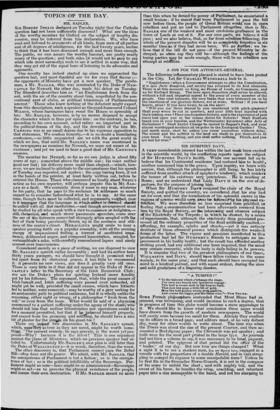SIR HUIVIPHRY: DAVY. .
A VERY considerable interest has within the last wear been excited in the scientific world, by the conflicting reports upon the subject of Sir MTN:PRAY DAVY'S health. While one .account led us to believe that his Continental residence had restbred him to health, another consigned him to the grave. Upon- inviry, we learn with SorrOw, that, although the philosopher is still living, he has lately suffered from another attack of apoplectic tenderidy, which renders the tenure of his existence very precarious. He is residing at Rome ; and we understand that Lady DAVY, is On the eve of de- parture, for the purpose of joining him. , When Sir HusirenRY 1)m/1r-resigned the chair of the Royal Society, and quitted the country, we.. considered ,that his star had set for ever, -and that the termination of his splendid career in the regions-of 'science Inuld yerIA.Ocrw ht latkrwectig his physical ex- tiittAidn':. We were therefore no less' surprised than gratified, ii finding. that a communication had been afterwards received from him by the Royal Society, on the interesting and obscure subject ti The Electricity of the Torpedo in Which he showed, by a series Of experiments, that, although the electricity thus generated pos- sessed all the ordinary properties of the fluid artificially excited,— affording,, for example, sparks and shocks,—yet it was entirely destitute of those chemical powers which distinguish the weakest 'forms of the latter. The vigour and precision manifested in this 'production had led Sir HUMPHRY:S friends to anticipate an im- provement in his bodily health; but the result' has afforded another striking proof, had any additional one been required, that the mind • may remain energetic, while the body is daily failing in its powers. It is singular that two of the greatest philosophers of our times, WOLLASTON and DAVY, should have-fallen victims to the same malady, in the same year; and that each should have occupied his mind in a kindred pursuit, and with equal ardour; during the slow and cold gradations of a lingering disease.


















 Previous page
Previous page